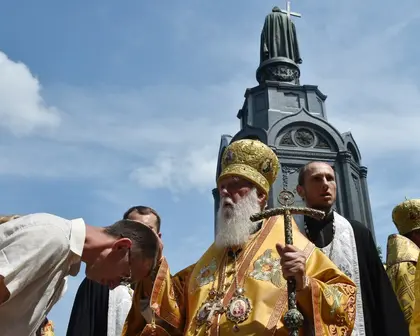The Synod of the Ecumenical Patriarchate of Constantinople on Oct. 11 recognized the legitimacy of bishops of the Kyiv Patriarchate and the Ukrainian Autocephalous Orthodox Church as part of the Constantinople church.
Until this decision, the pro-Ukrainian Kyiv Patriarchate and the Ukrainian Autocephalous Orthodox Church had not been recognized by the 14 official Orthodox churches, while the bishops of the pro-Russian Moscow Patriarchate in Ukraine had. The recognition is an important step towards the creation of an officially recognized independent (autocephalous) Ukrainian Orthodox Church.
- Read the newest Ukraine news stories published today.
- Read the newest Ukraine news stories published today.
- Russian Losses in Ukraine War
JOIN US ON TELEGRAM
Follow our coverage of the war on the @Kyivpost_official.
The Synod of the Ecumenical Patriarchate of Constantinople said on Oct. 11 it had lifted the anathema, or excommunication, imposed on Filaret, the patriarch of the Kyiv Patriarchate, and on Makariy, metropolitan of the Ukrainian Autocephalous Orthodox Church.
The Synod also approved recognizing the authority of the Constantinople Patriarchate in Ukraine, and canceled its 1686 decision to allow the patriarch of Moscow to appoint metropolitans of Kyiv. The Metropolis of Kyiv had been part of the Constantinople Patriarchate from the Christianization of Kyivan Rus in 988 until 1686.
The Constantinople Patriarchate also created a stavropegion in Kyiv – an entity that comprises churches or monasteries and is subordinated directly to the patriarch, as opposed to local bishops.
Moreover, the Synod approved plans to create an autocephalous (independent) Ukrainian church.
The Kyiv Patriarchate and the Ukrainian Autocephalous Orthodox Church are planning to merge with pro-independence bishops of the Moscow Patriarchate into an independent (autocephalous) Ukrainian church, which is expected to get a tomos — a Synod decree recognizing the independence of the Ukrainian church from the Constantinople church.
“This decision gives us the opportunity to unite with bishops of the Moscow Patriarchate who are willing (to join),” Filaret said on Oct. 11.
He said that the Kyiv Patriarchate, the Ukrainian Autocephalous Orthodox Church and some of the Ukrainian bishops of the Moscow Patriarchate would soon hold a congress to create a united church, and elect their head.
In May Sofroniy, the Moscow Patriarchate’s metropolitan of Cherkasy and Kaniv, said that up to 10 out of 53 bishops from the Moscow Patriarchate in Ukraine supported the autocephaly of the Ukrainian church.
Responding to speculation that he would be demoted to a “metropolitan” due to the official recognition, Filaret said he would remain patriarch.
The Constantinople Patriarchate also appealed “to all sides involved to avoid the appropriation of churches, monasteries and other properties, as well as every other act of violence and retaliation, so that the peace and love of Christ may prevail.”
One of the issues under discussion is whether the new Ukrainian church will acquire Moscow Patriarchate property in the country, and whether it will cause confrontation and violent protests.
Filaret said that after the creation of an independent Ukrainian church Moscow Patriarchate bishops would still have a right to serve in Ukraine but would have no right to call themselves a “Ukrainian church.”
“Moscow wants a conflict, and we — Ukrainians — don’t want it,” he added.
“God has seen the Ukrainian people’s struggle for independence,” Ukrainian President Petro Poroshenko said, commenting on the Constantinople church’s decision on Oct. 11. “He has heard our prayers and appreciated our work. He made sure that his Holiness Ecumenical Patriarch Bartholomew and the Synod of the Constantinople Patriarchate told us ‘yes’.”
In contrast, the Moscow Patriarchate called the Constantinople church’s decision “catastrophic” and warned that something “terrible” would begin.
Representatives of the Russian Orthodox Church said it would have to terminate relations with the Constantinople Patriarchate, and also called for the excommunication of Ecumenical Patriarch Bartholomew.
On Sept. 7, the Constantinople Patriarchate appointed two exarchs, or ambassadors, in Kyiv as efforts to create an independent Ukrainian church began to gain pace.
Filaret was defrocked by the Russian Orthodox Church in 1992 and excommunicated by the Moscow Patriarchate in 1997. He later appealed to the patriarch of Constantinople to cancel the excommunication.
He co-founded the Kyiv Patriarchate in 1992 and became the patriarch of Kyiv in 1995.
Filaret was the metropolitan of Kyiv as part of the Moscow Patriarchate in 1968 to 1992. He was also the locum tenens, or acting head, of the Russian Orthodox Church and a competitor for the job of the patriarch of Moscow in 1990.
The Ukrainian Autocephalous Orthodox Church was founded in 1919 during the brief period of Ukraine’s independence after the collapse of the Russian Empire.
In 1991 the Ukrainian Orthodox Church of the Moscow Patriarchate declared its independence from Moscow for the first time, but later most Ukrainian bishops revoked their signatures from the declaration.
The Ukrainian Orthodox Church of the Moscow Patriarchate has more than 12,000 parishes in Ukraine, while the Kyiv Patriarchate has about 5,000 parishes, and the Ukrainian Autocephalous Orthodox Church has about 2,000 parishes.
The popularity of the Kyiv Patriarchate has increased since Russia launched its war against Ukraine in 2014, and some parishes have switched from the Moscow Patriarchate to the Kyiv Patriarchate.
The Ukrainian Greek Catholic Church, which is part of the Roman Catholic Church, has more than 3,000 parishes, mostly in Western Ukraine.
You can also highlight the text and press Ctrl + Enter




